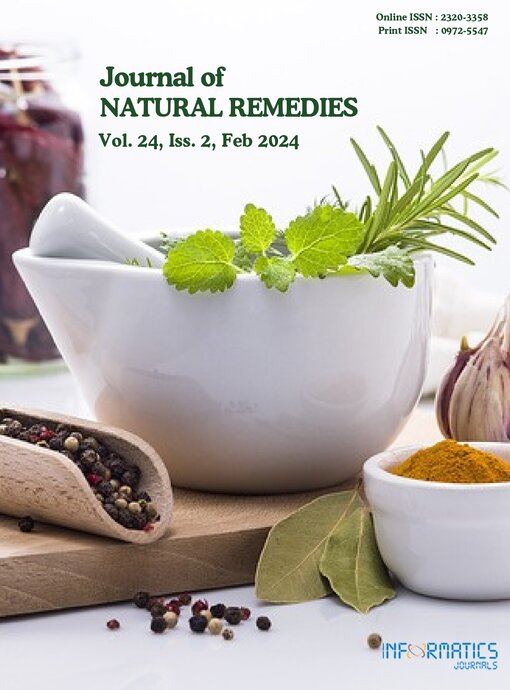Isolation, Formulation and Assessment of Anti-inflammatory Properties of Ursolic Acid from Nerium oleander -Errata for this article is published under Volume 24, Issue 3, 2024
DOI:
https://doi.org/10.18311/jnr/2024/33540Keywords:
Bioactive Substance, Inflammatory Activity, Nerium oleander, Ursolic AcidAbstract
Purpose: The purpose of the research work was the extraction and isolation of Ursolic Acid (URA) from the leaves of Nerium oleander (N. oleander) and the assessment of its anti-inflammatory activity using an in-vitro model.
Methods: Ursolic Acid (URA) is a bioactive molecule. It is a key component of N. oleander. The hydroalcoholic maceration method was used for extract preparation and was used to isolate the bioactive components of URA. The prepared extract, isolated URA were characterize and analyse by using pharmacognostic parameters, Fourier Transform Infrared (FTIR) and Thin Layer Chromatography (TLC) method. The carrageenan-induced inflammation rat paw oedema test in-vitro model was used for the assessment of anti-inflammatory properties of isolated bioactive compound URA.
Results: The results of evaluation and characterization indicated that the extract’s ash value and extractive values were within the parameters specified in the Indian Ayurvedic Pharmacopoeia. The prepared hydroalcohalic extract has potential bioactive components such as flavonoids, saponins, and triterpinoids. The isolated compound was URA. The extract may be able to alleviate inflammation, according to the percentage inhibition. Conclusion: The URA was successfully removed from the leaves of N. oleander. The examination criteria revealed that the extract contained certain small contaminants, which may have anti-inflammatory effects.
Downloads
Metrics
Downloads
Published
How to Cite
Issue
Section
License
Copyright (c) 2024 Ajay Kumar Shukla, Manish Kumar Yadav, Komal Sharma (Author)

This work is licensed under a Creative Commons Attribution 4.0 International License.
Accepted 2023-10-26
Published 2024-02-01
References
Chaudhary K, Prasad DN, Sandhu BS. Preliminary pharmacognostic and phytochemical studies on Nerium oleander Linn. (White cultivar). Journal of Pharmacognosy and Phytochemistry. 2015; 4(1):185-8.
Dey P, Chaudhuri TK. Pharmacological aspects of Nerium oleander Mill: A comprehensive review. Phcognosy Review. 2014; 8:156-62. https://doi.org/10.4103/0973-7847.134250 PMid:25125887 PMCid:PMC4127823 DOI: https://doi.org/10.4103/0973-7847.134250
Namdeo P, Gidwani B, Tiwari S, Jain V, Joshi V, Shukla SS, Pandey RK, Vyas A. Therapeutic potential and novel formulations of ursolic acid and its derivatives: An updated review. Journal of the Science Food and Agriculture. 2023; 103(9):4275-92. https://doi.org/10.1002/jsfa.12423 PMid:36597140 DOI: https://doi.org/10.1002/jsfa.12423
Seo DY, Lee SR, Heo JW, No MH, Rhee BD, Kyung Soo Ko, Kwak HB, Han J. Ursolic acid in health and disease. Korean Journal of Physiology and Pharmacology. 2018; 22(3):235-48. https://doi.org/10.4196/kjpp.2018.22.3.235 PMid:29719446 PMCid:PMC5928337 DOI: https://doi.org/10.4196/kjpp.2018.22.3.235
Chakravarty AK, Mukhopadhyay S, Das B. Swtane terpenoids from Swertia chirayita. Phytochemistry. 1991; 30:4092-87. https://doi.org/10.1016/0031-9422(91)83473-X DOI: https://doi.org/10.1016/0031-9422(91)83473-X
Rana VS. Raw coside and antioxidant constituents from the rhizomes of Sweria speciosa. Chemistry and Biodiversity. 2005; 2(10):1310-15. https://doi.org/10.1002/cbdv.200590102 PMid:17191931 DOI: https://doi.org/10.1002/cbdv.200590102
Mourya P, Shukla A, Rai G, Lodhi S. Hypoglycemic and hypolipidemic effects of ethanolic and aqueous extracts from Ziziphus oenoplia (L) Mill on alloxan-induced diabetic rats. Beni-suef University Journal of Basic and Applied Sciences. 2017; 6:1-9. https://doi.org/10.1016/j.bjbas.2016.12.002 DOI: https://doi.org/10.1016/j.bjbas.2016.12.002
Gupta M, Lodhi S, Shukla A. Preliminary phytochemical analysis and in vitro anti-helminthic activity of Martynia annua Linn and Permotrema reticulatum. Asian Journal of Biomaterial Research. 2015; 1(2):72-4.
Gupta R, Sharma P, Garg A, Shukla A, Jain AP. Investigation of in-vitro anthelmintic activity of Ficus elastica leaves. Journal of Drug Discovery and Therapeutics. 2013; 1(5): 1-3.
Bajaj J, Dave V, Sharma S, Shukla A, Chakole RD. Pharmacognostical and phytochemical studies on Achyranthes aspera. World Journal of Biomedical and Advanced Research. 2012; 1(04):1316-31.
Garg S, Garg A, Shukla A, Dev SK, Bishnoi RS, Kumar M. Review on antioxidant evaluation methods: In- vitro and invivo models. Asian Journal of Pharmacy and Pharmacology. 2018; 4(2):147-154. https://doi.org/10.31024/ajpp. 2018.4.2.8 DOI: https://doi.org/10.31024/ajpp.2018.4.2.8
Shukla A, Mourya P. Investigations for anti-urolithiatic olithiatic activity of roots against Tephrosia purpurea ethylene glycol-induced renal calculi in rats. Asian Journal of Pharmacy and Pharmacology. 2016; 2(2):40-3.
Tiwari J, Shukla A. Investigations on Calliandra haematocephala flowers extract for in-vitro anthelmintic activity Advance Pharmaceutical Journal. 2016; 1(1):17-20.
Huamana MAL, Luz A, Quispe T, Isabel R, Quispe H, Alberto C, Floresa S, Caycho R. A simple method to obtain ursolic acid. Results in Chemistry. 2021; 3:100144. https:// doi.org/10.1016/j.rechem.2021.100144 DOI: https://doi.org/10.1016/j.rechem.2021.100144
Gupta M, Bisht D, Khatoon S, Srivastava S, Rawat AKS. Determination of ursolic acid a biomarker in different Swertia species through high-performance thin layer chromatography. Chinese Medicine. 2011; 2:121-4. DOI: https://doi.org/10.4236/cm.2011.24020
Ghasemzadeh F, Darzi GN, Mohammadi M. Extraction and purification of ursolic acid from the apple peel and in-vitro assessment of the biochemical antibacterial, antioxidant and wound healing characteristics. Applied Food Biotechnology. 2022; 9(1):17-30.
Datar PA. Formulation and evaluation of the polyherbal gel prepared using carbopol 934 for treating skin diseases in comparison with ointment using emulsifying ointment. Research and reviews: Journal of Pharmaceutics and Nanotechnology. 2013; 1(1):19-21.
Viswanad V, Aleykutty NA, Jayaka B, Zacharia SM, Thomas L. Development and evaluation of antimicrobial herbal formulations containing the methanolic extract of Samadera indica for skin diseases. Journal of Advanced Pharmaceutical Technology and Research. 2012; 3(2):106-11. https://doi.org/10.4103/2231-4040.97285 PMid:22837958 PMCid:PMC3401671 DOI: https://doi.org/10.4103/2231-4040.97285
Lodhi S, Pawar RS, Jain AP, Singhai AK. Wound healing potential of Tephrosia purpurea (Linn.) Pers. in rats. Journal of Ethnopharmacology. 2006; 108(2):204-10. https://doi. org/10.1016/j.jep.2006.05.011 PMid:16806763. DOI: https://doi.org/10.1016/j.jep.2006.05.011

 Ajay Kumar Shukla
Ajay Kumar Shukla









 0.35
0.35 24
24 0.161
0.161